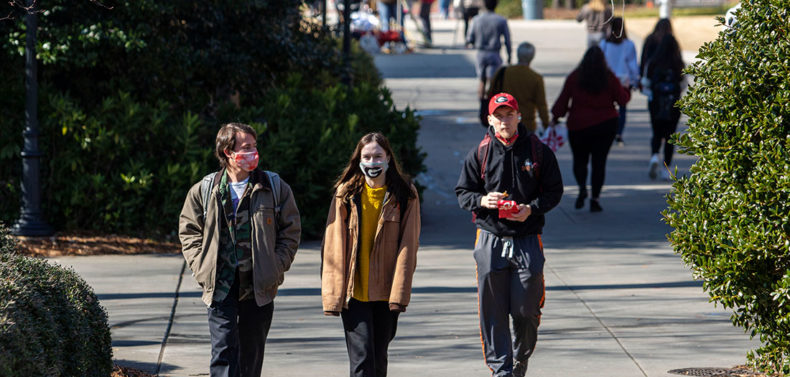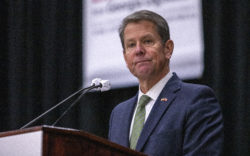The University of Georgia resumed classes with an emphasis on in-person instruction last week, despite the rise in the weekly number of COVID-19 cases in Athens-Clarke County reaching an all-time high this month.
The University System of Georgia Board of Regents, which governs the state’s public colleges and universities, announced its decision in October that “in-person instruction maximizes the well-being and mental health of each student.” UGA plans to move classes to larger classrooms to accommodate more physically present students at once, while still adhering to social distancing guidelines. UGA also plans to encourage more synchronous or live classes, which students need to attend either in person or virtually at a designated time.
Since the announcement, teachers have heard mixed messages from their departments concerning how to enforce attendance policies and how they may facilitate their courses. David Ingle, an English instructor, says his department will once again require attendance in its classes, a policy abandoned for the fall 2020 semester. After the first couple of weeks, Ingle says, out of a total of 19 students no more than two students physically attended his classes, and about six to eight students attended via Zoom.
While the students will receive a few more no-excuse absences than they would in the past, they will no longer be able to livestream their English courses, as the department suspects streaming may discourage in-person attendance. “You can look at any metric you want to look at. [COVID-19] is worse now than ever,” Ingle says. “If those decisions were predicated on the data, which they should be, then I don’t understand why you’re going to have this renewed emphasis on in-person instruction at a time when things are worse than ever. It seems potentially dangerous to me.”
Life During a Pandemic
Nathan Pollard, a sophomore finance major, says he struggled to keep up with his online classes in the fall. While the course structure allowed him to stay on top of his schoolwork after he contracted a mild case of COVID-19 and isolated in his apartment for two weeks, he says he found it difficult to learn and engage with course content.
Despite the ease of access to his coursework while isolating, Pollard says he welcomes the addition of more in-person classes with masks and social distancing.
“I had three professors last semester that just posted pre-recorded lectures, and it’s not the same at all,” Pollard says. “If you don’t understand it, you can’t really ask a question [unless] you email them and wait a long time. And by the point they respond, you already forgot your question.”
Abbey Swearingin, a senior biology major, also says she fell behind in her coursework during the fall. “I felt kind of disconnected,” Swearingin says. “I wouldn’t say it was terrible, mental-health wise. I could still email teachers and talk to people, but I had to spend some time to figure out time management.”
Assuming most instructors opt for lenient attendance policies, Swearingin says, she prefers in-person classes. Calling it a “gray area,” she believes strict attendance policies during the pandemic may negatively impact students with unfavorable conditions, such as high-risk students.
Likewise, Joe Steuer, a junior political science and social studies education double major, says he prefers in-person instruction. While he feels as though “you’re getting more bang for your buck for your tuition,” Steuer says he understands why some students would feel uncomfortable going to class so he disagrees with compulsory attendance policies.
Janet Frick, a UGA psychology professor who primarily teaches freshmen, says she observed the toll that social isolation wreaked on her students in the fall. Starting school in the midst of a pandemic hindered the ability of freshmen to acclimate to college culture and learn how to succeed as college students, Frick says.
Nevertheless, Frick says, the decision to increase the number of students physically in classrooms irritates her. In regard to UGA’s claim of low classroom transmission of COVID-19 in the fall, Frick says it lacks bearing, considering the low level of in-person attendance.
“I appreciate the fact that parents want their kids to have in-person instruction,” says Frick, a parent of a UGA student herself. “But the thing I’ve been saying to parents repeatedly is there’s not a single university in the country that is going to have normal in-person classes in the spring. I think that we’re in for a really rude awakening in terms of the rates of campus infection we’re likely to see.”
No Break, or Testing
To prevent the spread of COVID-19 both inside and outside Athens, UGA canceled spring break and dispersed three non-instructional days throughout the academic calendar.
Pollard says he’s unhappy with the situation, but he ultimately agrees with the university’s decision. “It is what it is,” Pollard says. “Obviously, if they don’t cancel it, you’re going to have a bunch of students going out partying Lord knows where all over the country, maybe even internationally, and possibly spreading the virus.”
Likewise, Ingle says he agrees with the cancellation, as it may avoid a huge spike in cases from students traveling back to Athens from their hometowns and vacation spots. Frick, on the other hand, believes students need a break—not to party, but to mentally recoup during a stressful semester.
Steuer says he believes the university’s decision “screws over” the students who follow COVID-19 guidelines. “People that are going to go on vacation or pack in bars are still going to do so, regardless of whether spring break exists or not,” Steuer says.
UGA continues to advise its community members to use DawgCheck, a voluntary self-reporting app, before arriving on campus. At the beginning of the fall semester, Swearingin logged any potential symptoms into the app every day. But she forgot to use it by the end of the semester, and “it just became an email you see at 1 a.m. every day,” Swearingin says.
“I probably would have done the same thing when I was 18, 19 or 20 years old—just to hell with it,” Ingle says. “There’s no compelling reason for people to be honest. But if a large percentage of students, faculty and staff were being tested—not on a volunteer basis but a mandatory basis on a regular rotation—I mean, the tests don’t lie [except for] a small percentage of false positives and false negatives. I think DawgCheck is essentially just hygiene theater and window dressing, and it just kind of makes it seem like they’re doing something when, really, it’s probably not that effective.”
Other universities in the Southeast, such as the University of South Carolina and the University of Florida, require students to take a COVID-19 test either before returning to campus or throughout the semester. UGA requires neither, but it has increased its testing capabilities to accommodate up to 1,500 tests per day for a three-week period upon the return of students.
“There are a bunch of us who have been saying for months that everyone needs to have mandatory testing because what we have right now is people opting in who are probably on the safer side and other students refusing to do it,” Frick says. “Without mandatory testing, we have absolutely no way to have any reasonable knowledge of what’s really going on with rates of campus infection. And that is just completely irresponsible.”
In December, UGA announced it would reduce the number of days in which an asymptomatic individual must quarantine after exposure to someone who tested positive for COVID-19. Rather than quarantining for 14 days, these individuals must only quarantine for 10 days, which follows revised guidelines from both the Centers for Disease Control and Prevention and the Georgia Department of Public Health. The university encourages these individuals to get tested for COVID-19 at the end of the 10-day period.
Making the Best of It
Attending classes during a global pandemic adds a unique challenge to the already hectic life of a college student, but there are a few techniques that students and their instructors found helpful
To keep track of a heavy course load with both in-person and online classes, Frick says it’s important to become as organized as possible. She says students should write every date down and understand the various policies for each course.
“If your professor is not being clear, politely ask them anything that’s not clear to you, because we don’t always realize what we haven’t been clear about,” Frick says. “Understand: Some professors have a lot of autonomy in their department and some don’t. So it may not be your instructor being unnecessarily strict. It may be something that’s being required by their dean or department head.”
Ingle says students should “actively resist that tendency toward isolation” by going out for a walk, getting safely involved with campus groups and engaging in class as much as possible. “If you’re attending classes online, don’t just go into Zoom meetings and sit there with your camera off, not saying a word,” he says. “Speak up, turn on your camera, turn on your mic and talk. Somebody’s got to talk for these next 15 minutes, and if it’s none of you, then it’s going to be me for the whole 15 minutes. And you don’t want that. It’s just going to be boring—right?”
Like what you just read? Support Flagpole by making a donation today. Every dollar you give helps fund our ongoing mission to provide Athens with quality, independent journalism.










